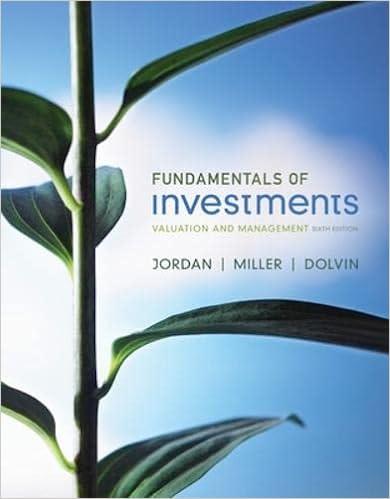Question
ASSIGNMENT TWO: After reading the two attachments: Financial System Meltdown: Mitigating Strategies Lessons Learnt Future Policy Guidelines,Presentation by: Kwamina G. Acquah, Dominic Owusu, Sharon G.
ASSIGNMENT TWO: After reading the two attachments: Financial System Meltdown: Mitigating Strategies Lessons Learnt Future Policy Guidelines,Presentation by: Kwamina G. Acquah, Dominic Owusu, Sharon G. Dzirasah, Benjamin Kwablah, Samuel Afriyie and George A. Bentum. AND Liquidity Risk Management: An area of Increased focus for insurers by Claire Both, FIA, CERA, Paul Fulcher, FIA, CERA, Fred Vosvenieks, FIA, CERA, and Russell Ward, FIA. You have been appointed as the Government Risk Czar for Ghana, after reading the above pieces, write a risk policy paper to the Bank of Ghana, Ministry of Finance and the Presidency convincing these three key stakeholders why Ghc 400 million required bank capital for tier one bank is inadequate. Any supporting outside materials should be helpful.
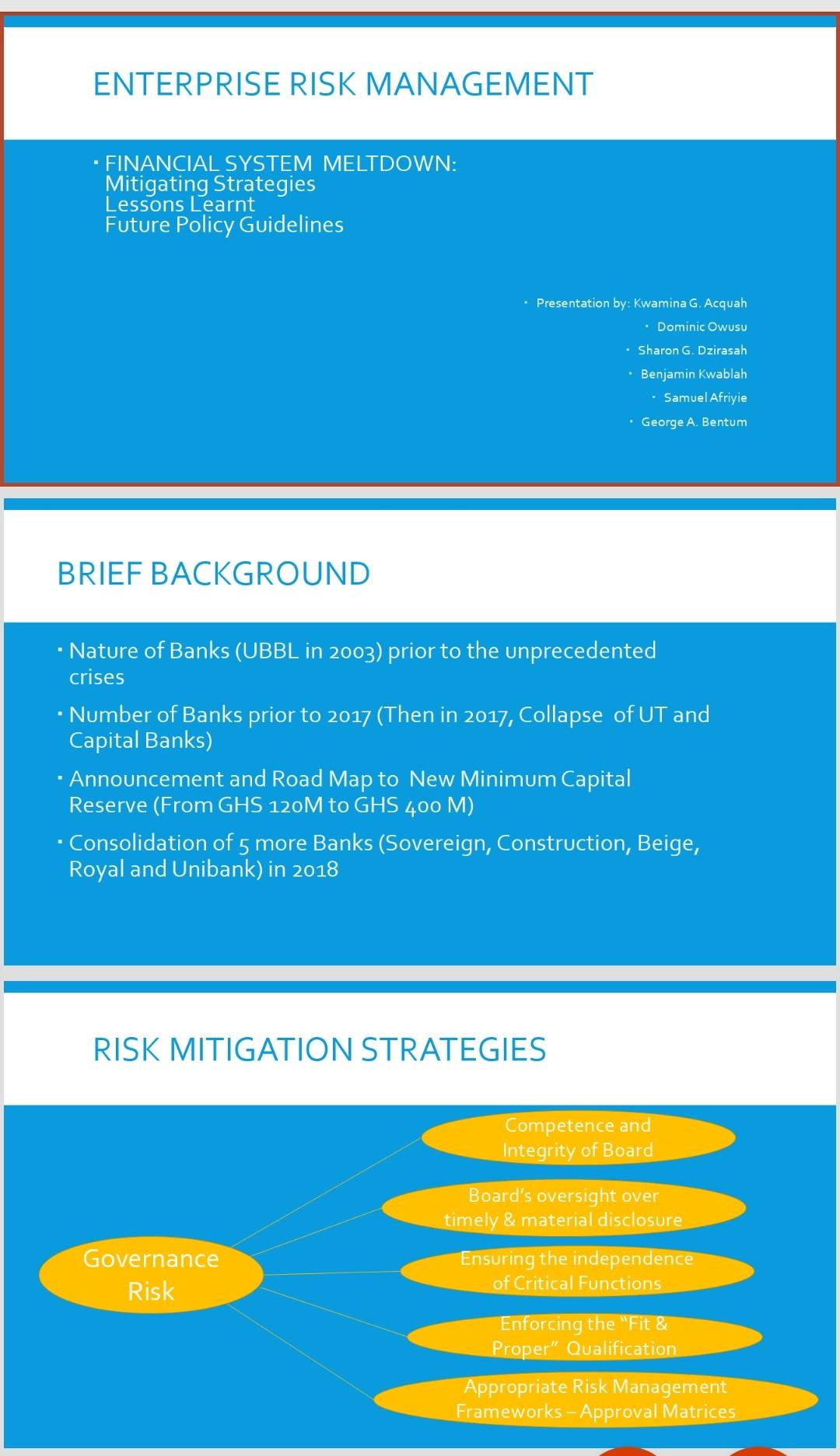
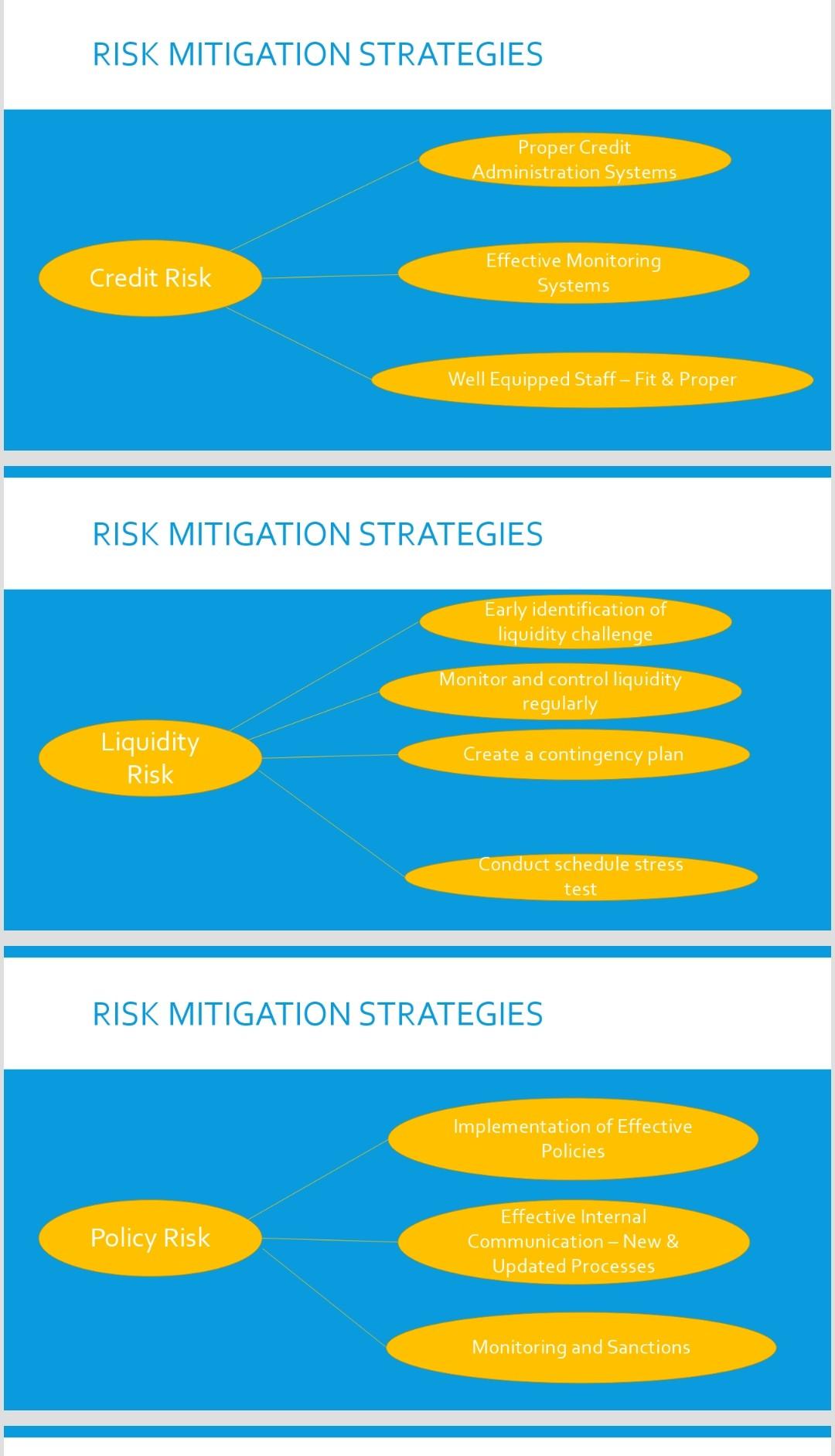
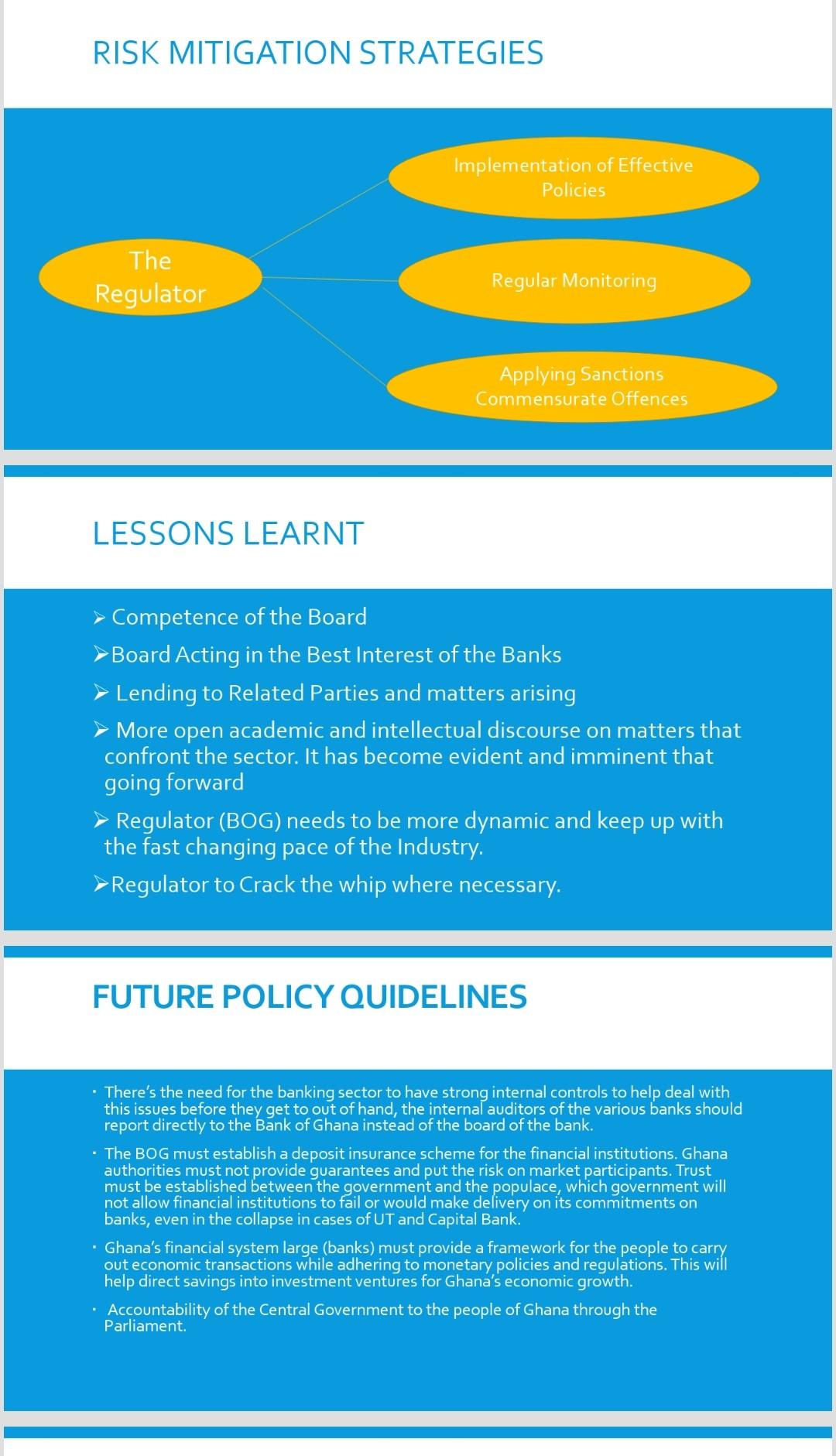
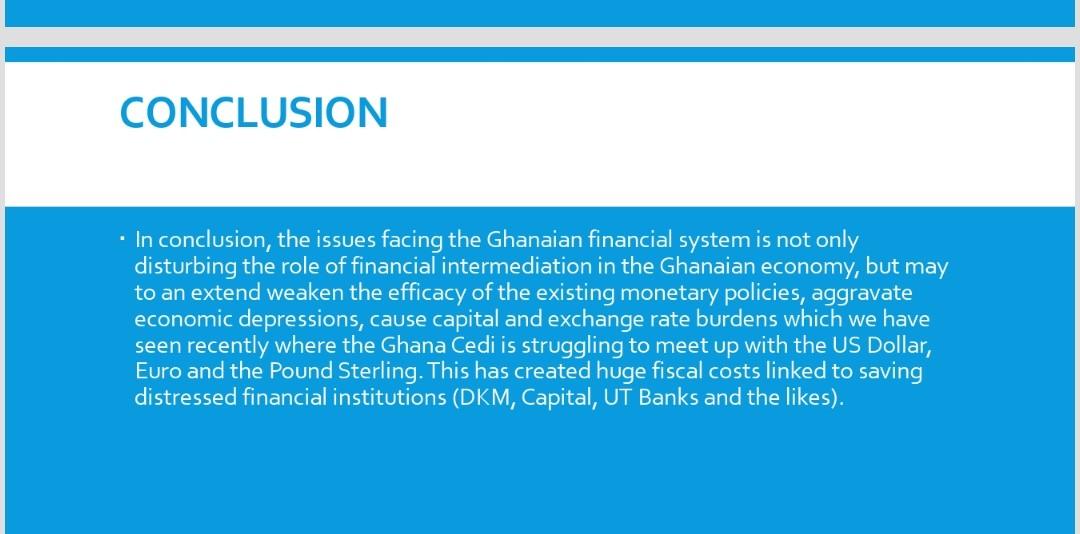
ENTERPRISE RISK MANAGEMENT - FINANCIAL SYSTEM MELTDOWN: Mitigating Strategies Lessons Learnt Future Policy Guidelines Presentation by: Kwamina G. Acquah Dominic Owusu Sharon G. Dzirasah Benjamin Kwablah . Samuel Afriyie George A. Bentum BRIEF BACKGROUND Nature of Banks (UBBL in 2003) prior to the unprecedented crises Number of Banks prior to 2017 (Then in 2017, Collapse of UT and Capital Banks) Announcement and Road Map to New Minimum Capital Reserve (From GHS 120M to GHS 400 M) - Consolidation of 5 more Banks (Sovereign, Construction, Beige, Royal and Unibank) in 2018 RISK MITIGATION STRATEGIES Competence and Integrity of Board Board's oversight over timely & material disclosure Ensuring the independence of Critical Functions Governance Risk Enforcing the "Fit & Proper" Qualification Appropriate Risk Management Frameworks - Approval Matrices RISK MITIGATION STRATEGIES Proper Credit Administration Systems Credit Risk Effective Monitoring Systems Well Equipped Staff - Fit & Proper RISK MITIGATION STRATEGIES Early identification of liquidity challenge Monitor and control liquidity regularly Liquidity Risk Create a contingency plan Conduct schedule stress test RISK MITIGATION STRATEGIES Implementation of Effective Policies Policy Risk Effective Internal Communication - New & Updated Processes Monitoring and Sanctions RISK MITIGATION STRATEGIES Implementation of Effective Policies The Regulator Regular Monitoring Applying Sanctions Commensurate Offences LESSONS LEARNT > Competence of the Board >Board Acting in the Best Interest of the Banks > Lending to Related Parties and matters arising More open academic and intellectual discourse on matters that confront the sector. It has become evident and imminent that going forward > Regulator (BOG) needs to be more dynamic and keep up with the fast changing pace of the Industry. >Regulator to Crack the whip where necessary. FUTURE POLICY QUIDELINES There's the need for the banking sector to have strong internal controls to help deal with this issues before they get to out of hand, the internal auditors of the various banks should report directly to the Bank of Ghana instead of the board of the bank. The BOG must establish a deposit insurance scheme for the financial institutions. Ghana authorities must not provide guarantees and put the risk on market participants. Trust must be established between the government and the populace, which government will not allow financial institutions to fail or would make delivery on its commitments on banks, even in the collapse in cases of UT and Capital Bank. Ghana's financial system large (banks) must provide a framework for the people to carry out economic transactions while adhering to monetary policies and regulations. This will help direct savings into investment ventures for Ghana's economic growth. Accountability of the Central Government to the people of Ghana through the Parliament. CONCLUSION . In conclusion, the issues facing the Ghanaian financial system is not only disturbing the role of financial intermediation in the Ghanaian economy, but may to an extend weaken the efficacy of the existing monetary policies, aggravate economic depressions, cause capital and exchange rate burdens which we have seen recently where the Ghana Cedi is struggling to meet up with the US Dollar, Euro and the Pound Sterling. This has created huge fiscal costs linked to saving distressed financial institutions (DKM, Capital, UT Banks and the likes). ENTERPRISE RISK MANAGEMENT - FINANCIAL SYSTEM MELTDOWN: Mitigating Strategies Lessons Learnt Future Policy Guidelines Presentation by: Kwamina G. Acquah Dominic Owusu Sharon G. Dzirasah Benjamin Kwablah . Samuel Afriyie George A. Bentum BRIEF BACKGROUND Nature of Banks (UBBL in 2003) prior to the unprecedented crises Number of Banks prior to 2017 (Then in 2017, Collapse of UT and Capital Banks) Announcement and Road Map to New Minimum Capital Reserve (From GHS 120M to GHS 400 M) - Consolidation of 5 more Banks (Sovereign, Construction, Beige, Royal and Unibank) in 2018 RISK MITIGATION STRATEGIES Competence and Integrity of Board Board's oversight over timely & material disclosure Ensuring the independence of Critical Functions Governance Risk Enforcing the "Fit & Proper" Qualification Appropriate Risk Management Frameworks - Approval Matrices RISK MITIGATION STRATEGIES Proper Credit Administration Systems Credit Risk Effective Monitoring Systems Well Equipped Staff - Fit & Proper RISK MITIGATION STRATEGIES Early identification of liquidity challenge Monitor and control liquidity regularly Liquidity Risk Create a contingency plan Conduct schedule stress test RISK MITIGATION STRATEGIES Implementation of Effective Policies Policy Risk Effective Internal Communication - New & Updated Processes Monitoring and Sanctions RISK MITIGATION STRATEGIES Implementation of Effective Policies The Regulator Regular Monitoring Applying Sanctions Commensurate Offences LESSONS LEARNT > Competence of the Board >Board Acting in the Best Interest of the Banks > Lending to Related Parties and matters arising More open academic and intellectual discourse on matters that confront the sector. It has become evident and imminent that going forward > Regulator (BOG) needs to be more dynamic and keep up with the fast changing pace of the Industry. >Regulator to Crack the whip where necessary. FUTURE POLICY QUIDELINES There's the need for the banking sector to have strong internal controls to help deal with this issues before they get to out of hand, the internal auditors of the various banks should report directly to the Bank of Ghana instead of the board of the bank. The BOG must establish a deposit insurance scheme for the financial institutions. Ghana authorities must not provide guarantees and put the risk on market participants. Trust must be established between the government and the populace, which government will not allow financial institutions to fail or would make delivery on its commitments on banks, even in the collapse in cases of UT and Capital Bank. Ghana's financial system large (banks) must provide a framework for the people to carry out economic transactions while adhering to monetary policies and regulations. This will help direct savings into investment ventures for Ghana's economic growth. Accountability of the Central Government to the people of Ghana through the Parliament. CONCLUSION . In conclusion, the issues facing the Ghanaian financial system is not only disturbing the role of financial intermediation in the Ghanaian economy, but may to an extend weaken the efficacy of the existing monetary policies, aggravate economic depressions, cause capital and exchange rate burdens which we have seen recently where the Ghana Cedi is struggling to meet up with the US Dollar, Euro and the Pound Sterling. This has created huge fiscal costs linked to saving distressed financial institutions (DKM, Capital, UT Banks and the likes)
Step by Step Solution
There are 3 Steps involved in it
Step: 1

Get Instant Access to Expert-Tailored Solutions
See step-by-step solutions with expert insights and AI powered tools for academic success
Step: 2

Step: 3

Ace Your Homework with AI
Get the answers you need in no time with our AI-driven, step-by-step assistance
Get Started


